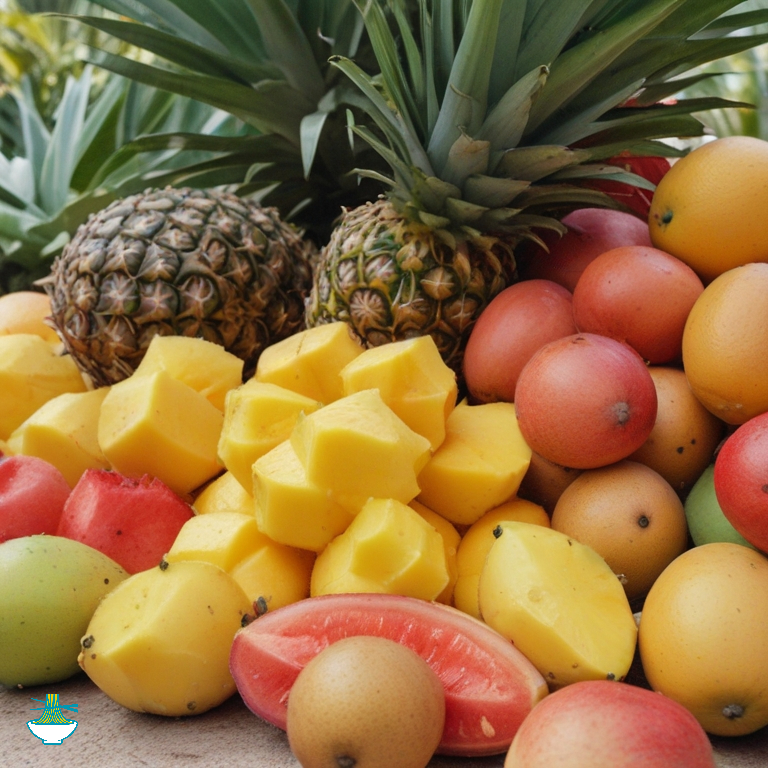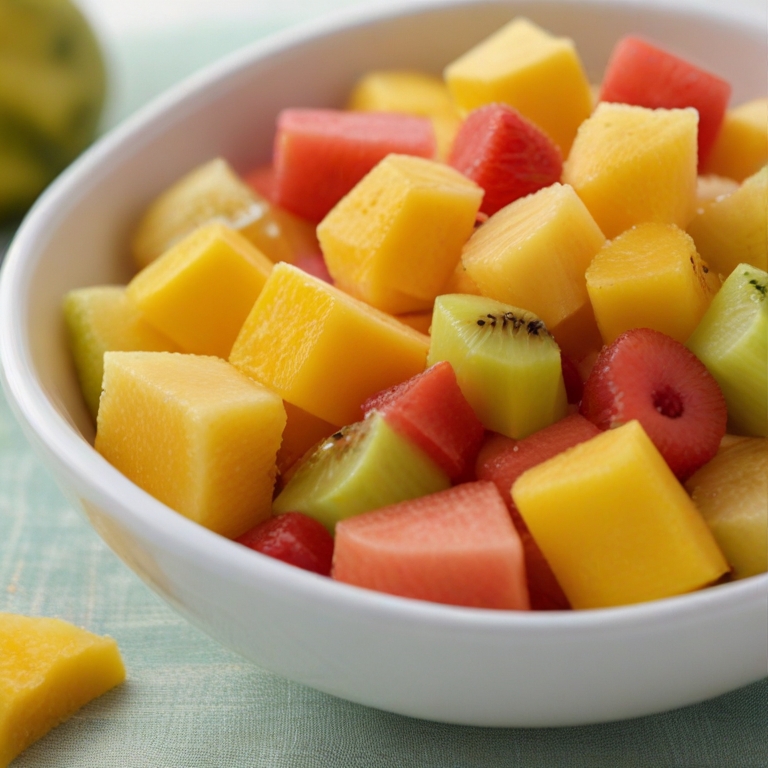This tropical fruit salad recipe is a delightful combination of fresh pineapple, mango, guava, and other local fruits, tossed together for a burst of tropical flavors. It's a simple yet delicious way to enjoy the natural sweetness and juiciness of these fruits, perfect for a refreshing snack or a light dessert. The addition of honey or agave syrup enhances the sweetness, while fresh mint leaves add a hint of freshness to the salad.
Tropical fruit salads have a long history in tropical regions where these fruits are abundant. Indigenous communities often combined local fruits to create refreshing and nutritious dishes. Over time, these recipes evolved as various cultures incorporated their own twists, such as adding sweeteners like honey or syrups for added flavor. Today, tropical fruit salads are enjoyed worldwide for their vibrant colors, enticing flavors, and health benefits, showcasing the diversity and richness of tropical fruits.
Ingredients:
- 1 cup diced pineapple
- 1 cup diced mango
- 1 cup diced guava
- 1 cup mixed local fruits (such as papaya, banana, or passion fruit)
- 2 tablespoons honey or agave syrup (optional)
- Fresh mint leaves for garnish (optional)

Method:
1. Wash and peel the fruits as needed. Cut them into bite-sized pieces.
2. In a large bowl, combine the diced pineapple, mango, guava, and other local fruits.
3. If using honey or agave syrup, drizzle it over the fruits and gently toss to coat.
4. Garnish with fresh mint leaves for added flavor and presentation.
5. Serve chilled as a refreshing and healthy tropical fruit salad.
This recipe is straightforward and should be easy to follow. Enjoy your tropical fruit salad!
Nutrition Value:
1. Diced Pineapple (1 cup):
- Calories: Approximately 82 kcal
- Carbohydrates: Around 22 grams
- Protein: About 0.9 grams
- Fat: Almost 0.2 grams
- Sodium: Less than 2 milligrams
- Cholesterol: 0 milligrams
- Vitamins and Minerals: High in vitamin C, manganese, and copper.
- Nutritional Benefits: Pineapple is rich in bromelain, an enzyme that aids digestion, and provides antioxidants that support immune health.
2. Diced Mango (1 cup):
- Calories: Approximately 99 kcal
- Carbohydrates: Around 25 grams
- Protein: About 1.4 grams
- Fat: Almost 0.6 grams
- Sodium: Less than 2 milligrams
- Cholesterol: 0 milligrams
- Vitamins and Minerals: High in vitamin A, vitamin C, and folate.
- Nutritional Benefits: Mangoes are a good source of antioxidants like beta-carotene and may support skin health and immune function.
3. Diced Guava (1 cup):
- Calories: Approximately 112 kcal
- Carbohydrates: Around 24 grams
- Protein: About 4.2 grams
- Fat: Almost 1.6 grams
- Sodium: Less than 2 milligrams
- Cholesterol: 0 milligrams
- Vitamins and Minerals: High in vitamin C, vitamin A, potassium, and fiber.
- Nutritional Benefits: Guava is rich in antioxidants, supports digestive health due to its fiber content, and may help regulate blood sugar levels.
4. Mixed Local Fruits (1 cup, including papaya, banana, or passion fruit):
- Calories: Varies based on the mix, typically ranging from 60 to 120 kcal
- Carbohydrates: Varies based on the mix
- Protein: Varies based on the mix
- Fat: Varies based on the mix
- Sodium: Varies based on the mix
- Cholesterol: Varies based on the mix
- Vitamins and Minerals: Depending on the fruits used, they can provide a range of vitamins, minerals, and antioxidants.
- Nutritional Benefits: Local fruits offer a diverse array of nutrients, including vitamins, minerals, and phytonutrients, contributing to overall health and well-being.
5. Honey or Agave Syrup (2 tablespoons, optional):
- Calories: Approximately 120 kcal (for honey); 60 kcal (for agave syrup)
- Carbohydrates: Around 17 grams (for honey); 16 grams (for agave syrup)
- Protein: None
- Fat: None
- Sodium: Less than 2 milligrams
- Cholesterol: 0 milligrams
- Nutritional Benefits: Provides sweetness and flavor without significant nutritional benefits. Honey contains antioxidants and may have antibacterial properties, while agave syrup has a lower glycemic index.
6. Fresh Mint Leaves (for garnish, optional):
- Calories: Negligible (typically less than 1 kcal per serving)
- Carbohydrates: Negligible
- Protein: Negligible
- Fat: Negligible
- Sodium: Negligible
- Cholesterol: 0 milligrams
- Vitamins and Minerals: Contains small amounts of vitamins A and C, as well as trace minerals.
- Nutritional Benefits: Mint leaves add a refreshing flavor and may aid digestion and freshen breath.
These nutritional values are approximate and may vary based on factors such as ripeness, variety, and preparation methods. Adjustments can be made based on specific fruits used and any additions or modifications to the recipe.


Comments